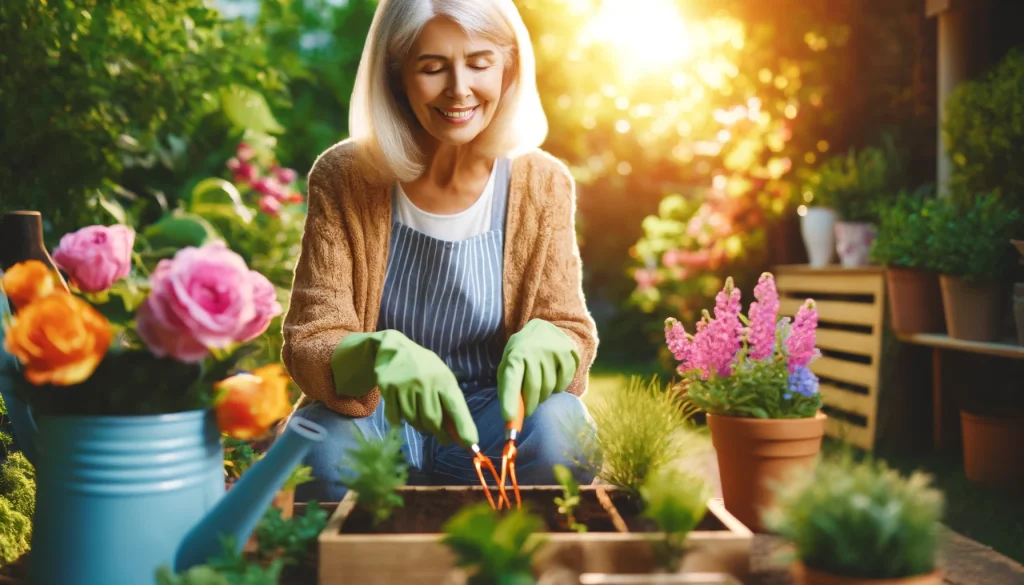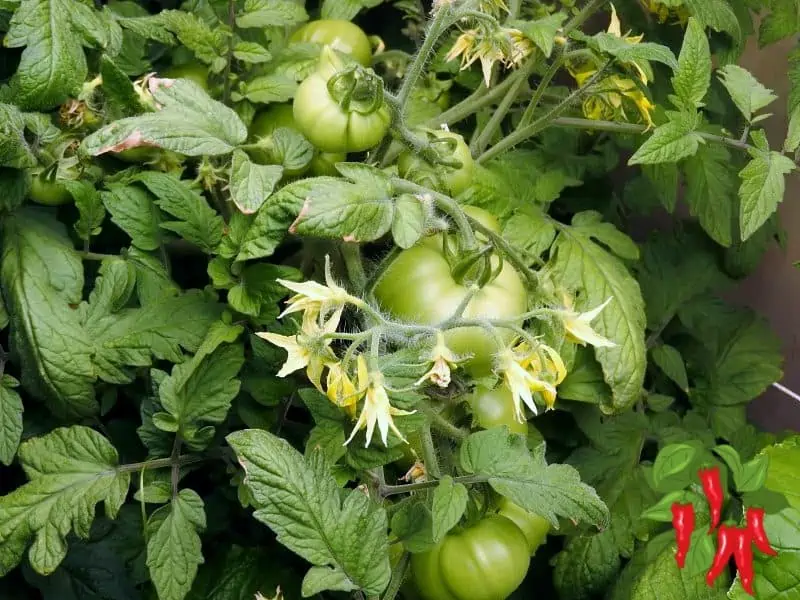This post may contain affiliate links. If you buy something from one of our links we may earn a commission. Thanks

Curious about the benefits of gardening for seniors? It’s more than just a way to pass the time. It’s a powerful tool for improving health and happiness.
Let’s explore why picking up a trowel might just be the best decision for seniors looking to enrich their lives.
Discover the Benefits of Gardening for Seniors
Gardening isn’t just about planting seeds and watching them grow and the benefits of gardening for seniors offer a whole therapeutic experience that brings a boatload of benefits, especially for seniors.
Getting your hands dirty and connecting with nature can truly transform the lives of older adults. It offers physical exercise, mental stimulation, and emotional joy. Let’s dig into the amazing benefits of gardening for seniors and see why it’s such a golden activity.
1. Minimizes Stress
Gardening has been shown to reduce stress and anxiety significantly. Caring for plants promotes mindfulness and helps seniors stay present, which can alleviate feelings of stress and improve overall mental well-being.
2. Improved Mood
Interacting with nature and spending time outdoors can elevate mood and boost happiness. Gardening releases dopamine, a chemical in the brain associated with pleasure, making it a natural way to combat depression and improve mental health.
3. Vitamin D Exposure
Spending time in the garden exposes seniors to sunlight, which is crucial for vitamin D synthesis. Vitamin D helps with calcium absorption, supporting bone health and reducing the risk of osteoporosis.
4. Boosts Immunity
Gardening can boost the immune system. The physical activity involved in gardening increases circulation and strengthens the immune response, helping seniors fend off illnesses.
Gardening is a low-impact exercise that enhances physical fitness. It improves flexibility, strength, and cardiovascular health, reducing the risk of chronic diseases such as heart disease and diabetes.
6. Cognitive Benefits
Gardening requires planning, problem-solving, and creativity, which can help improve cognitive function and memory. This mental stimulation is particularly beneficial in reducing the risk of dementia.
7. Sense of Purpose and Accomplishment
Tending to a garden gives seniors a sense of responsibility and purpose. Seeing their plants grow and flourish provides a sense of achievement and can significantly boost self-esteem.
8. Social Interaction
Gardening can be a social activity, providing opportunities for seniors to interact with others. Community gardens and gardening clubs are excellent ways for seniors to meet new people and build friendships.
9. Pain Reduction
Staying busy in the garden can help seniors take their minds off chronic pain and discomfort. The distraction of gardening activities and the endorphins released during physical activity can reduce the perception of pain.
10. Healthy Eating
Growing their own fruits and vegetables encourages seniors to eat healthier. The produce from their garden is fresh and free from harmful pesticides, promoting better nutrition and overall health.
11. Improves Bone Health
Gardening involves weight-bearing activities such as digging and lifting, which can help improve bone density and strength. This is particularly important for seniors to prevent osteoporosis and fractures.
12. Enhanced Balance and Coordination
Gardening activities require reaching, bending, and squatting, which can improve seniors’ balance and coordination. These movements help reduce the risk of falls and improve overall mobility.
13. Reduces Loneliness
Gardening can combat loneliness by providing opportunities for social interaction and community engagement. Joining a community garden or gardening club helps seniors connect with others and build a sense of community.
14. Better Sleep
Engaging in physical activity and spending time outdoors can promote better sleep. The combination of exercise, fresh air, and exposure to natural light helps regulate sleep patterns and improve sleep quality.
15. Fosters Creativity
Gardening allows seniors to express their creativity through the design and arrangement of their garden space. Choosing plant varieties, planning the layout, and creating beautiful garden landscapes can be a fulfilling and creative outlet.
The Benefits of Gardening for Seniors Conclusion
Gardening isn’t just a pastime; it benefits seniors, boosting physical health, mental sharpness, and emotional well-being.
From the sheer joy of watching a plant thrive to the physical activity that keeps the body moving, and the chance to make new friends, gardening can truly enrich the lives of older adults.
Key Takeaways
Benefits of gardening for seniors include improved physical health, enhanced mental well-being, and greater social interaction.
It’s a holistic activity that nurtures both body and mind, making it a fantastic choice for older adults.
If you’re looking for a fulfilling activity that nurtures both body and soul, gardening is your go-to.
So, seniors, it’s time to grab those gardening gloves and embark on a wellness journey through the beauty of gardening!
Read more: 6 Benefits of Gardening: Gardening’s Big Payoffs
Resources
If you’re interested in diving deeper into the benefits of gardening for seniors, these websites provide valuable information and support for senior health:
To fully appreciate the numerous advantages gardening offers to seniors, it’s helpful to explore resources that provide in-depth insights and research. Here are some trusted sources that highlight how gardening can enhance the physical, mental, and emotional well-being of older adults.
- AARP – The Benefits of Gardening AARP provides comprehensive information on how gardening can improve seniors’ health, including physical activity benefits and mental health improvements.
- Mayo Clinic – Healthy Aging: Tips for Gardening The Mayo Clinic offers practical tips and highlights the therapeutic benefits of gardening, emphasizing its positive impact on mental and physical health.
- National Institute on Aging – Gardening: A Gentle Way to Exercise This resource explains how gardening serves as a gentle form of exercise for seniors, helping to maintain strength, flexibility, and overall fitness.
- American Horticultural Therapy Association – Benefits of Gardening Learn about horticultural therapy and how gardening activities are used to promote health and well-being among seniors.
- Centers for Disease Control and Prevention (CDC) – Gardening Health Benefits The CDC discusses the various health benefits of gardening for older adults, including its role in reducing the risk of chronic diseases and improving mental health.
These resources offer valuable insights and practical advice, helping seniors make the most of their gardening activities to enhance their overall well-being.
Visit my Amazon Influencer Page for videos and gardening products Grow Your Own Garden






